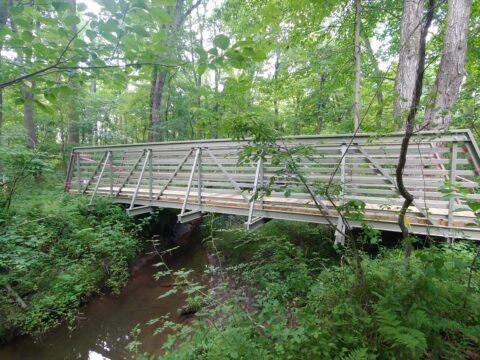Today is a big one for Pennsylvania clean water advocates – it’s the statewide day of digital action for a powerful Pennsylvania program: Growing Greener. Growing Greener is the largest single investment of PA state funds – over $1 billion so far – for environmental projects that benefit communities while ensuring cleaner water and green space for future generations. The state legislature is currently considering a new round of investments in a third phase of Growing Greener, using American Rescue Plan federal dollars, but it is far from a done deal.
So this week, we are spotlighting three DRWI partner organizations who have leveraged Growing Greener for three inspiring projects (among many!) that highlight the breadth and impact of public investment. You can learn more about Growing Greener here.

The Briarhill Preserve is found within 220 acres of protected lands in Whitpain Township. These lands feature current and planned hiking trails, and help protect Prophecy Creek, an important tributary of the Wissahickon Creek. Green spaces allow plants and trees to absorb and filter water before it goes into streams and rivers, and in our urbanized environment help keep water cleaner for drinking, fishing, and swimming. Today, Prophecy Creek is the cleanest in the area because of the green space that surrounds it. The effort to preserve Briarhill involved the township, the county, many families and the good folks at Wissahickon Trails, and has leveraged Growing Greener funding.
Together with Pennsylvania No-Till Alliance, our friends at Stroud Water Research Center have trained many farmers on the importance of farming for clean water, including by planting streamside forests and reducing runoff from fields. The trainings were followed up with mentoring for farmers interested in learning more and building stream-friendly practices into their farming operations, as well as tracking soil health. Farms can be a big part of water quality solutions, and their impacts add up throughout central PA.
Closer to Philadelphia, our friends at the Tookany/Tacony-Frankford Watershed Partnership (TTF) have leveraged Growing Greener funding for a Green Stormwater Infrastructure project at Abington Junior High School. The new rain gardens, installed just this spring, filter runoff from the school grounds before it flows into East Baeder Creek.
TTF and teachers used the construction of the rain gardens to engage students on soils and polluted runoff (also called stormwater). Junior high science classes attended construction sessions, and are now planning ways to monitor how successfully the rain gardens filter pollutants. Students will also help maintain and replant the rain gardens as needed over the years, creating an ongoing partnership for cleaner water in Abington.
These three projects are a snapshot of a much larger and more impactful program. With more than $1 billion in investments so far, the first two phases of Growing Greener have helped to
- Slash the backlog of farmland-preservation projects statewide;
- Protect open space;
- Eliminate the maintenance backlog in state parks;
- Clean up abandoned mines and restore watersheds;
- Provide funds for recreational trails and local parks;
- Help communities address land use;
- And provide new and upgraded water and sewer systems.